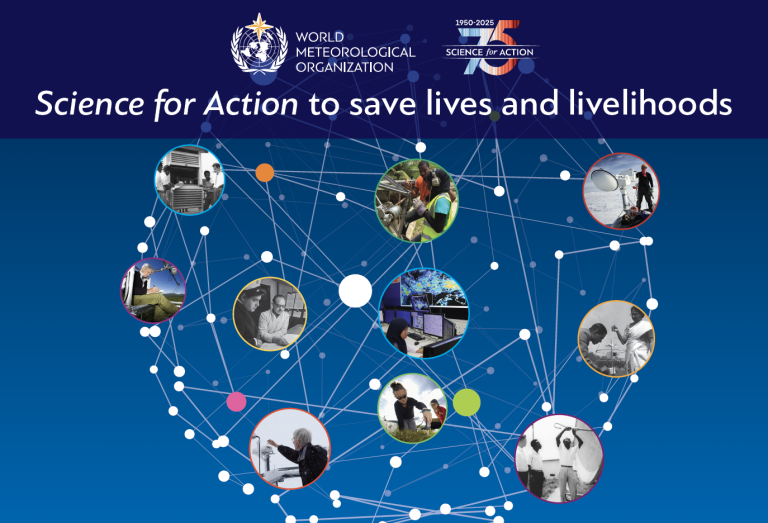WMO Secretary-General: We are more than just weather forecasters
World Meteorological Day on 23 March highlights the progress – and gaps – in life-saving forecasts and early warnings, which are vital for global economic and social well-being in an era of rapid change.
- WMO marks 75th anniversary as UN specialized agency
- World Meteorological Day theme is Closing the Early Warning Gap Together
- Forecasts and early warnings have averted billions in economic losses
- Extreme weather impacts are on the increase
- Investment in national meteorological and hydrological services is a must

This year marks the 75th birthday of the World Meteorological Organization (WMO) as a United Nations specialized agency, which has overseen the free and unrestricted exchange of data, products, and services underpinning decisions ranging from daily leisure activities to seasonal crop planting to multi-billion dollar infrastructure investments.
“We are more than just weather forecasters,” said Celeste Saulo. “WMO makes the world safer, more secure, and prosperous.”
WMO’s transformation of science into action for the global good is more necessary than at any time in its history.
WMO recently confirmed that 2024 was the hottest year on record. Ocean warming and sea level rise is accelerating. Glacier retreat and melting ice threaten long-term changes. This is accompanied by more extreme weather events such as rapidly intensifying tropical cyclones, devastating rainfall, storm surges, flooding, deadly droughts, and wildfires.
“The theme of this year’s World Meteorological Day – Closing the Early Warning Gap Together – reminds us that, in this new climate reality, early warning systems are not luxuries. They are necessities and sound investments – providing an almost ten-fold return,” said UN Secretary-General António Guterres in a message.
“Yet, almost half the world’s countries still lack access to these life-saving systems. It is disgraceful that, in a digital age, lives and livelihoods are being lost because people have no access to effective early warning systems,” he said.
World Meteorological Day is observed on 23 March each year. It showcases the essential contribution of National Meteorological and Hydrological Services to society and to building a safer, more resilient world.
“The staff of National Meteorological and Hydrological Services are like doctors and nurses – working 24/7 to safeguard and promote public well-being,” said WMO Secretary-General Celeste Saulo.
“During the past 75 years, we have brought billions of dollars in added value to the global economy. We have saved billions more in averted economic losses from weather, climate and water-related hazards. And we have saved hundreds of thousands of lives,” she said.

Advances and Gaps
Every minute of every day, data flows from monitoring stations across the world to weather prediction centers. Millions of individual measurements – from satellites, from stations on the ground, from weather balloons, from ocean buoys and ships, from satellites, from aircraft – and more.
Without WMO coordination and its unified network, each country would face the impossible task of collecting global data on its own.
While forecasting capabilities have advanced significantly, gaps remain in observation networks, forecasting accuracy, and access to high-quality climate and hydrological data.
Strengthening National Meteorological and Hydrological Services (NMHSs) in developing nations is not only vital for climate adaptation – it is essential for global resilience, security, and economic stability.
Early Warnings For All
Between 1970 and 2021, global reported economic losses from weather, climate and water hazards were a staggering US$ 4.3 trillion. More than 2 million people died.
Economic costs continue to soar, but the death toll is falling.
WMO’s top overriding priority the UN Secretary-General’s Early Warnings for All initiative to ensure that early warning systems protect everyone by the end of 2027.
At the halfway point of Early Warnings for All, WMO is proud to report progress. As of 2024, 108 countries report having some capacity for multi-hazard early warning systems. This is more than double the 52 countries in 2015.
Technological advances and Artificial Intelligence promise to revolutionize weather forecasting. But it is essential to level the playing field and ensure that nobody is left behind and to close the gaps in data and observations.
The call to action on World Meteorological Day is therefore to:
- Innovate together to scale up technologies.
- Stand together to foster collaboration in countries.
- Invest together to create, mobilize, and share resources.
WMO and its partners in Early Warnings For All are now expanding support to additional countries beyond the initial 30 focus countries and intensifying partnerships with bilateral and multilateral donors, development banks, and climate funds to boost resources and collaboration.
“We need high-level political support for the Initiative within countries, a boost in technology support, greater collaboration between governments, businesses and communities, and a major effort to scale-up finance. Increasing the lending capacity of the Multilateral Development Banks is key,” said Mr Guterres.
Notes to Editors
The World Meteorological Organization (WMO) is a specialized agency of the United Nations responsible for promoting international cooperation in atmospheric science and meteorology.
WMO monitors weather, climate, and water resources and provides support to its Members in forecasting and disaster mitigation. The organization is committed to advancing scientific knowledge and improving public safety and well-being through its work.
For further information, please contact:
- Clare Nullis WMO media officer cnullis@wmo.int +41 79 709 13 97
- WMO Strategic Communication Office Media Contact media@wmo.int

